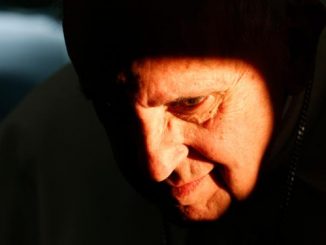
Aboard the papal plane, Sep 25, 2018 / 03:06 pm (CNA/EWTN News).- Pope Francis took responsibility Tuesday for the agreement between the Holy See and the People’s Republic of China, noting that in any such negotiation, “both sides lose something.”
He was asked about the agreement Sept. 25 during the flight from Tallinn to Rome by Antonio Pelayo of Vida Nueva.
The agreement on the appointment of bishops in mainland China was signed Sept. 22 in Beijing. It will allow for bishops who are in communion with the Holy Father and at the same time are recognized by the Chinese government.
Francis said the agreement was the fruit of a dialogue that has taken several years.
“The Vatican team worked a lot,” he said. He noted the efforts of Archbishop Claudio Maria Celli, president emeritus of the Pontifical Council for social Communications; Fr. Rota Graziosi, an official of the Roman curia; and Cardinal Pietro Parolin, the Vatican Secretary of State.
Cardinal Parolin, he said, “has a special devotion to the lens; he studies all of the documents down to the period, comma, notes, and this gives me a great assurance.”
“You know that when you make a peace agreement or a negotiation, both sides lose something,” Pope Francis reflected. “This is the law. Both sides. And you move ahead.”
The Bishop of Rome said that the dialogue which led to the agreement was a process of going two steps forward and one step back. “Then, months passed without speaking to each other and then the time of God, which appears to be [the time of the] Chinese. Slowly. This is wisdom, the wisdom of the Chinese.”
He said that “the bishops who were in difficulty were studied case-by-case,” and that “dossiers came on to my desk about each one. And I was responsible for signing the case of the bishops.”
Following this, drafts of the agreement were put on his desk, Pope Francis said. They were discussed and “I gave my ideas.”
“I think of the resistance, the Catholics who have suffered. It’s true. And they will suffer. Always, in an agreement, there is suffering. They have a great faith.”
He said they have written him, saying that “what the Holy See, what Peter says, is that which Jesus says. The martyrial faith of these people today goes ahead. They are the great ones!”
“I signed the agreement,” Pope Francis stated. “I am responsible.”
“The others, whom I appointed, in all have worked for more than 10 years. It’s not an improvisation. It’s a path, a true path.”
He noted that after a “famous communique of an ex-apostolic nuncio, the episcopates of the world wrote me, saying clearly that they felt close, that they were praying for me.”
“The Chinese faithful wrote and the signature of this writ was from a bishop, let’s say it this way, of the traditional Catholic Church and from a bishop of the patriotic Church, together and faithful, both of them. For me, it was a sign from God,” Pope Francis stated.
The pope also recalled, saying “thanks be to God that this is over”, that in Latin America “for 350 years it was for the king of Portugal and of Spain to appoint the bishops, and the Pope only gave jurisdiction.”
“We forget the case of the Austro-Hungarian Empire: Maria Teresa was tired of signing the appointments of bishops and gave jurisdiction to the Vatican. These were other times, and thanks be to God that they aren’t repeated.”
He stated that under the agreement with China, the Chinese government will not appoint the bishops: “No, this is a dialogue about eventual candidates but Rome appoints, the Pope appoints.”
“And let us pray for the suffering of some who don’t understand, and who have behind them so many years of being clandestine.”
Announcing the deal on Saturday, the Holy See had said that “the shared hope is that this agreement may favor a fruitful and forward-looking process of institutional dialogue and may contribute positively to the life of the Catholic Church in China, to the common good of the Chinese people and to peace in the world.”
Beijing established the Chinese Patriotic Catholic Association in 1957 to regulate Catholics living in China, and Catholics in the country have been divided between members of the patriotic Church and the “underground Church”.
The agreement between the Holy See and the People’s Republic is meant to end the split between the patriotic and underground Churches.
The Chinese Catholic Patriotic Association is under the day-to-day direct supervision of the Chinese Communist Party since a March 2018 decision by which the Chinese government shifted direct control of religious affairs to the Chinese Communist Party’s United Front Work Department.
In recent years, Chinese authorities have cracked down on underground Christian churches, as well as on Muslims throughout western provinces.
 […]
[…]






